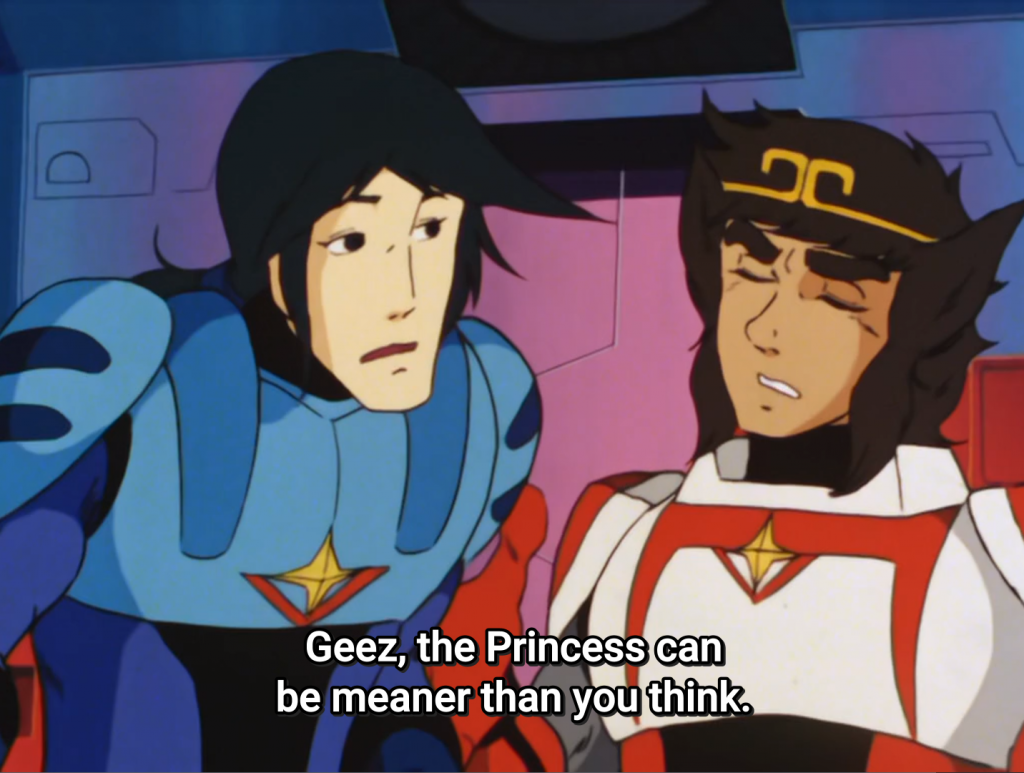The Ghost Monster’s True Identity

While eating, Hakka is struck by an invisible ghost. Moreover, an energy pipe is broken, and the Cosmos loses power. As soon as they switch to infrared lighting, Hakka sees the ghost for what it really is: a gaseous monster with phosphorus-like properties. They must get rid of it as soon as possible, but Kugo cannot use the Astro Pole for fear of damaging the ship’s interior. Soon after, the monster rushes into the Princess’s room in search of the Galaxy Energy!
You can download the torrent file from Anidex or Anirena, or get direct links from AnimeTosho.
Translation Thoughts
There’s so much dialogue in this episode. It was exhausting!
In this episode, Jogo and Kugo really bully the poor Hakka, and they should be over that by now. As expected, the Princess is pissed off about it. It pissed me off, too!
Jogo teaches kids that watch this show a lot about phosphorus and its properties in this episode. Phosphorus exists in two major forms: white phosphorus (also called yellow phosphorus) and red phosphorus. As Jogo mentions, when white phosphorus is exposed to oxygen, it produces a very faint glow in the dark, between green and blue. Also, the odor of its combustion has a characteristic garlic smell.
The heads of modern strike-anywhere matches usually contain phosphorous sulfide, produced only with red phosphorous. The most common matches that you strike on an abrasive strip in the matchbook do not have phosphorus sulfide in the head; the phosphorus sulfide is actually in the strip. These are safer than the strike-anywhere kind.
Like Jogo says, white phosphorus is extremely toxic to humans.
I’m sure one or two of you will learn something new about phosphorus if you watch the episode!
At 1:53 Hakka says:
これだから姫は話せるんだよね
Kore dakara hime wa hanaseru nda yo ne
This is why Princess can speak, isn’t it?
That’s a correct translation without any context. But you shouldn’t translate this line like that in this case.
The meaning of 話せるhanaseru (can speak/can talk) comes from 話す hanasu (speak/talk). But 話せる hanaseru can also mean “to be understanding” or “to be sensible”. It is still the potential form of 話す hanasu (potential form of the verb “to speak” is “can speak”) but depending on the context, it can mean “to be understanding”, like in this case.
This episode looks like a showcase for Japanese insults. Here are some new ones that I haven’t covered in previous episodes. At 2:01 Kugo and Jogo say:
くいしんぼう
Kuishinbou
Glutton
It can also mean “gluttony”. Another example, at 5:19 Jogo says:
何を言ってるんだこのねぼすけ
Nani o itteru nda kono nebosuke
What are you talking about, sleepyhead?
A ねぼすけ nebosuke is a person who’s always sleepy, or who over sleeps.
kind of out of character moment for Jugo there, scolding Hakka the way he did. He was much nicer during the previous 56 eps. Anyway, the princess is an enabler.
And yet another rip-off. This time Starzinger stole from the movie Prometheus. Something has melted metal equipment like hot knife through butter. It left an unknown yellow substance in its wake. What does the super smart crew do? They pick it up with their own hands!
Anyway, the monsters are weak against oxygen. They catch fire whenever they come in contact with it. And yet they spent most of the episode roaming around the ventilation shafts. Reminded me of a certain movie where aliens that died whenever they touched water decided to invade Earth, a planet that has 70% or more of its surface covered in water. In the aliens defense, the planet name is kind of misleading.
A couple more minutes into the episode we get to see a whole different genre of Japanese art when the princess gets trapped alone in a room and starts moaning while being attacked by several tentacled monsters. But that is OK because the heroes arrive just in time and spray the monsters with oxygen. Which makes them catch fire. Yes, let’s save the princess by burning all those monsters. That are hugging her. With fire!
PS: the only thing I knew about phosphorus (before your awesome lesson) was the phosphorus was not in the matches, but in the strip. A teacher told us that when we were in school, lots and lots of years ago. I think we were studying the Periodic Table. Probably. Anyway, thank you very much for reminding me how old I am.